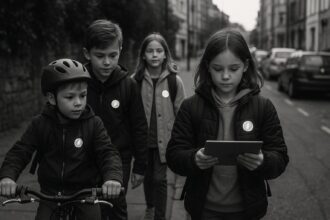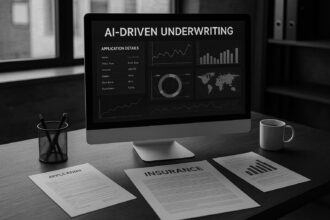As UK employers increasingly adopt video body doubling and digital monitoring to boost productivity, workers express growing discomfort over privacy intrusions, reigniting debates on surveillance ethics and the future of remote work.
As the boundaries between work and home gradually blur, a growing trend is emerging among employers keen to ensure their remote workers remain productive. This trend, often referred to as “body doubling,” involves keeping employees on continuous video calls throughout the workday, with colleagues virtually present but often silent. The strategy, designed to stimulate a sense of accountability and companionship, has sparked a significant debate about privacy and the psychological impact on workers.
Proponents of body doubling argue that it can boost productivity and counteract feelings of isolation that come with remote work. Originally developed to help children with ADHD focus in educational settings, this method has been adapted by businesses as a productivity tool for adult workers. Alice Lang, a digital PR executive, shared her experience, stating, “It’s a good middle ground—I still get to work from home, but with a bit of company when I need it.” Yet, this approach has raised serious concerns regarding employee autonomy, with critics dubbing it an intrusive step towards a surveillance culture. One employee expressed discomfort, noting, “Sometimes it feels a bit much. I don’t really want someone monitoring my every move. It can feel quite Big Brother-y being watched in your own home.”
This monitoring trend is not limited to video calls. A recent report indicated that a substantial number of companies are turning to various monitoring tools, not just to evaluate productivity but also to bolster their control over staff. The rise of such practices has led to increased scrutiny. According to data from union Prospect, surveillance of remote workers has surged, with significant numbers reporting being monitored through cameras and other digital tools, raising alarm bells about the potential erosion of workplace privacy.
The ethical concerns surrounding employee monitoring have ignited discussions across media and political platforms. Labour has called for updated regulations to safeguard workers from invasive surveillance technologies, which are becoming all too commonplace in today’s working environment. Polling data revealed that approximately one in five UK adults suspect they are under employer surveillance, with monitoring practices covering everything from timekeeping to email and message tracking. In workplaces where these methods are employed, employees often feel their privacy is compromised, a sentiment echoed by the union Prospect, which highlighted that many workers report feeling “deeply uncomfortable” with such oversight.
Moreover, data show that more than half of UK employers believe they cannot trust their employees without some form of monitoring. This perception has prompted a worrying trend; employees are increasingly resorting to dubious methods, such as using mouse jigglers to simulate activity on monitoring systems. Such behaviours lay bare the broader implications of increased surveillance, which tend to undermine trust between workers and management and can foster a toxic workplace culture where employees feel the need to “game” the system rather than engage authentically.
The hybrid working model, which gained prominence during the pandemic, continues to evolve, leading many business leaders to call for a return to traditional office settings. A significant push from companies such as Amazon, JP Morgan, and Lloyds Banking Group suggests an effort to combat what they perceive as a decline in productivity. The rising frustration with remote work environments has set the stage for potential conflicts, as employees prioritise flexibility and work-life balance while navigating demands for in-person attendance.
As the post-pandemic world unfolds, the delicate balance between monitoring for productivity and protecting employee rights remains a contentious issue. While some firms advocate for increased supervision, many employees simply wish for the freedom to work without constant oversight. The future of remote work hinges on addressing these concerns and finding a sustainable path that respects both the needs of businesses and the dignity of workers.
Reference Map:
- Paragraph 1 – [1], [2]
- Paragraph 2 – [1], [3]
- Paragraph 3 – [4], [5]
- Paragraph 4 – [6], [7]
- Paragraph 5 – [1], [3]
Source: Noah Wire Services
- https://www.dailymail.co.uk/news/article-14750399/Big-Brother-watching-you-Growing-number-Brits-working-home-spied-bosses-make-sure-not-skiving.html?ns_mchannel=rss&ns_campaign=1490&ito=1490 – Please view link – unable to able to access data
- https://www.ft.com/content/fcd7639c-9ab2-4e3e-940a-7a88a2feaf0d – This article examines the ethical considerations of employers monitoring remote staff beyond basic metrics like mouse clicks. It discusses instances where companies have used surveillance tools to track employee activity, leading to debates about privacy and trust. The piece also highlights the rise of devices designed to simulate activity, such as mouse jigglers, and the broader implications of increased monitoring on employee well-being and productivity.
- https://prospect.org.uk/news/new-protections-needed-to-stop-employer-surveillance-of-remote-workers – Prospect’s polling reveals a significant increase in workplace surveillance, with 32% of workers now being monitored, up from 24% six months prior. The use of camera monitoring in employees’ homes has doubled, with 13% of home workers currently under such surveillance. The article calls for stricter regulations and protections to prevent intrusive monitoring practices by employers.
- https://www.theguardian.com/world/2023/oct/02/uk-adults-monitored-by-employer-workplace-surveillance – A survey commissioned by the Information Commissioner’s Office found that one in five UK adults believe they have been monitored by an employer. The most common practices include tracking timekeeping and access, as well as monitoring emails, files, calls, or messages. The article discusses the implications of such surveillance on employee privacy and well-being.
- https://workplacejournal.co.uk/2025/02/half-of-bosses-say-they-cannot-trust-staff-without-monitoring-study-finds/ – A study by ExpressVPN indicates that over half of UK employers feel they cannot trust their employees without monitoring. The research highlights the prevalence of online employee monitoring techniques, including tracking websites visited, apps used, and monitoring computer screens. It also reveals that more than half of employees would quit if subjected to such surveillance.
- https://www.computerweekly.com/news/366539253/Workers-deeply-uncomfortable-with-digital-surveillance-at-work – A survey by union Prospect found that UK workers are ‘deeply uncomfortable’ with digital surveillance and automated decision-making in the workplace. The study highlights strong opposition to various forms of digital monitoring, including wearable tracking devices and the use of cameras to monitor workers in the office and at home.
- https://www.independent.co.uk/news/uk/politics/working-from-home-surveillance-spying-b1789011.html – Labour has called for updated regulations to protect workers from digital surveillance by employers while working from home. The article discusses the rise of remote surveillance technologies and the need for stronger protections to ensure workers are not monitored without their consent.













